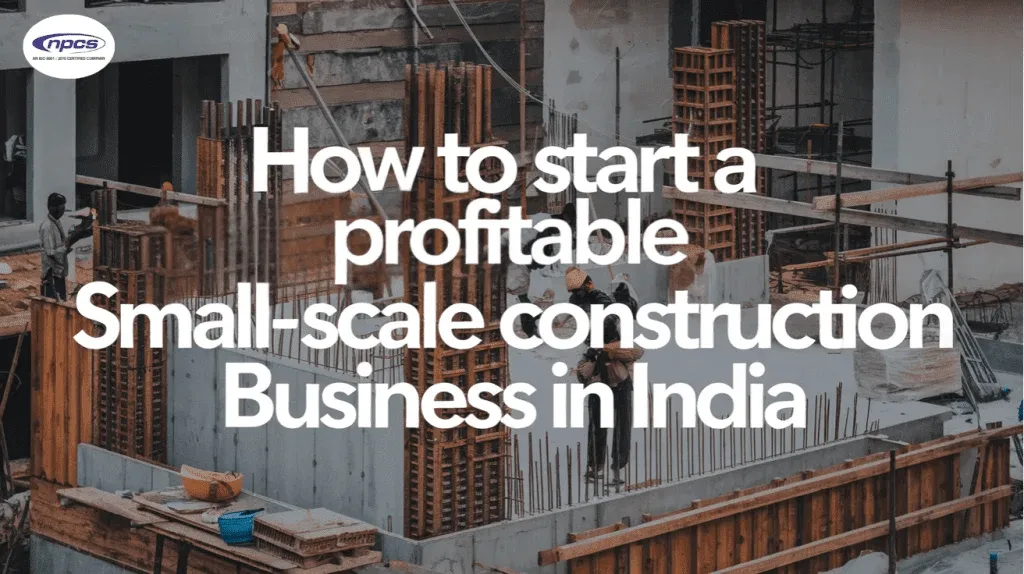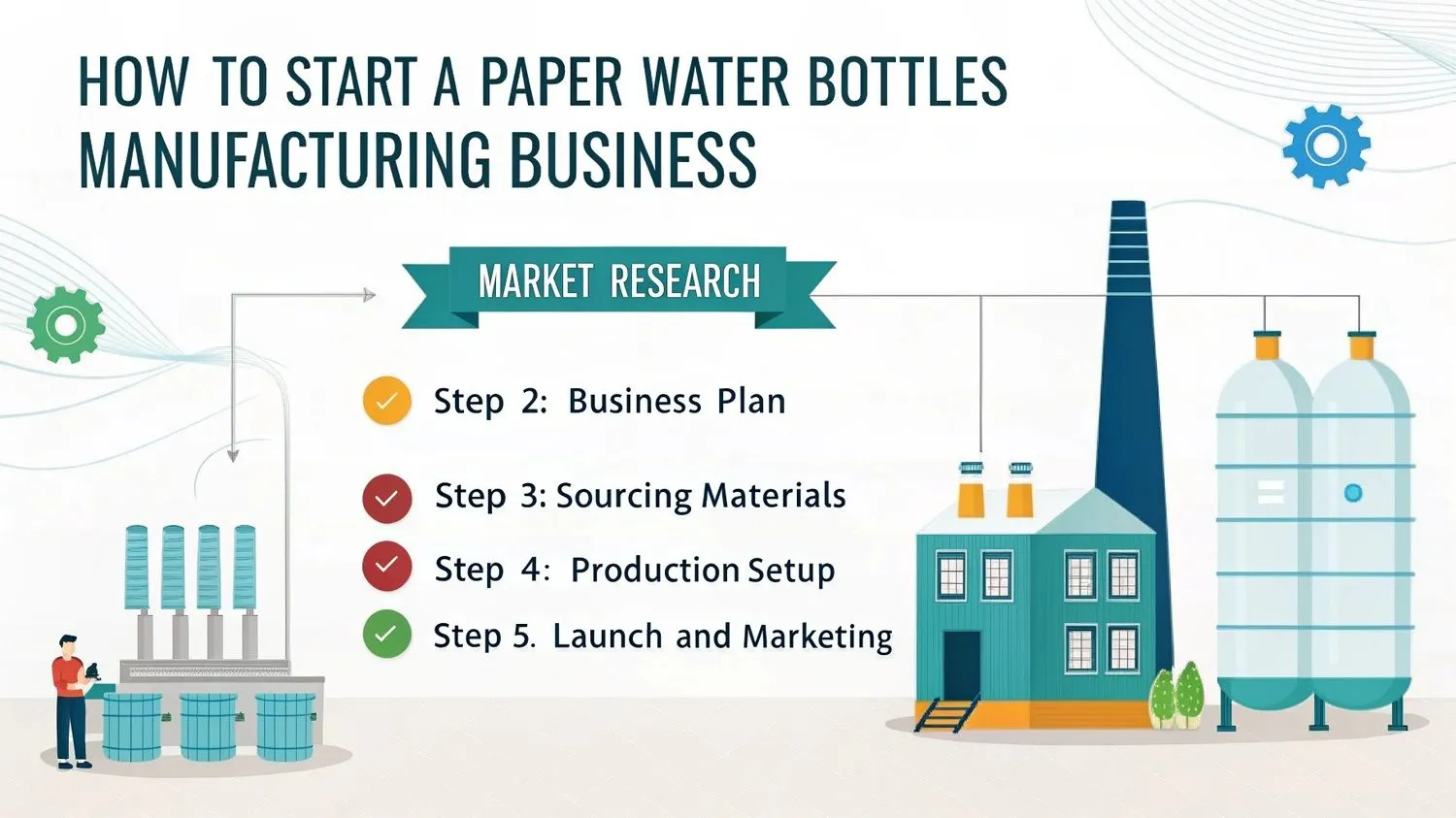The upsurge of the construction business in India happens to be one of the most promising industries, providing very interesting entrepreneurial opportunities. Establishing a construction business could be worth your while, yet it requires thorough planning, resource management, and going through all legal formalities. Here is a step-by-step guide to help you kick-start a small-scale and profitable construction business in India.
Contents
- 0.1 1. Undertake market research.
- 0.2 2. Develop a Comprehensive Business Plan
- 0.3 3. Register Your Business and LicenseÂ
- 0.4 4. Secure funds
- 0.5 5. Build a Competent Team
- 0.6 6. Invest in Equipment and Technology
- 0.7 7. Focus on Marketing and NetworkingÂ
- 0.8 8. Effective Project Management
- 0.9 9. Develop Financial Accountability
- 0.10 10. Centring around customer need
- 0.11 11. Strategically Scale Your Business
- 0.12 12. Catch Up with Trends in Industry
- 0.13 Final Thoughts
- 1 Frequently Asked Question
1. Undertake market research.
It is best to know your local market in terms of demand and supply for construction services in your area and in the areas where you really have evaluating competitors. The last will be the gaps in what they offer and find out who your specific target customers would be:
- What types of construction projects are commonly engaged in (residential, commercial, or industrial)?
- Most sought-after wants of services?
Thorough research could place at ease clearing ways of acknowledging the uniqueness of business in terms of unique solutions created to understand special client needs.
2. Develop a Comprehensive Business Plan
No business can progress without a solid business plan. Effective business plans must include
- Nature of your services.
- Start-up costs and how they will be funded.
- How marketing and client acquisition will be done.
- How equipment and materials will be procured.
Might serve as a map for that purpose and does not harm being presented to banks or other investors to raise money.
3. Register Your Business and LicenseÂ
The legal ground is covered for the business to run smoothly. To register your business, go for:Â
- Choose a business structure (solitary, partnership, or private limited company).Â
- Obtain a Director Identification Number (DIN) and Digital Signature Certificate (DSC).Â
- Register within the Ministry of Corporate Affairs (MCA) and acquire a certificate of incorporation.
- Go for GST registration for tax compliance.
In accordance with your location and the services you provide, you may also require specific permits or licenses, such as environmental clearance or any other statutorily required license under relevant labour laws.
4. Secure funds
Clearly laid down finances sustain a construction business. All construction businesses require money for equipment, raw materials, and labor. Here are various funding options:
- Bank loans: schemes such as MSME loans or contractor-specific financing options.
- Investors: Have a business plan to present to potential investors who are interested in supporting the project as a shareholder or profit sharing.
5. Build a Competent Team
Your team is crucial to the success of the construction business. You need to hire experienced engineers, architects, and skilled labor. Training and retaining talent can greatly improve the quality of the services it provides and the reputation of the company.
Also Read:Â
6. Invest in Equipment and Technology
Invest in modern technology and the best quality equipment for run-of-the-mill operation. Optimise the use of tools such as project management software to improve task handling and productivity. Invest in advanced construction techniques because it can offer a good head start for the business.
7. Focus on Marketing and NetworkingÂ
These services should usually widen a client base. From brochures and advertising to social media platforms, traditional marketing is very important. On the other hand, the whole industry obtained opportunities from networking, formed by strengthening the collaboration between business units and all three types of customers: suppliers, contractors, and clients.
8. Effective Project Management
Construction project management mainly revolves around the management of materials, time, and labour. Project management really becomes vital, without which efficiency and cost-saving will not be at their optimum levels. How do you improve this?
- Adopt Technology: Construction-specific project management software is integrated to provide an effective schedule, monitor progress, and manage resources. This eliminates a lot of hassle and the need for comprehensive software such as MS Project.
- Quality: Setting clear quality standards to meet customer expectations. Regular inspections and feedback loops help with the identification and fixing of issues before they lead to substantial rework costs.
- Health and Safety: Compliance with health and safety rules and regulations can protect the employees from injuries as well as save on legal costs. Ensuring that safety guidelines from the Bureau of Indian Standards (BIS) will also heighten the safety in the workplace.
9. Develop Financial Accountability
The small construction business deals with financial transactions on a large scale. Hence, robust financial management is very essential. Here’s how to stay on top:
- Keep personal and business finances separate. Open a separate business bank account to avoid mixing business expenses.
- Track Expenses: Use accounting software or hire an accountant to track cash flow.
- Stay tax compliant: Understand your tax liabilities, such as Goods and Services Tax (GST), and file returns on time to avoid penalties.
This meant the Indian construction industry was on its way to ₹60 lakh crores in 2025 as reported by Statista. Indian companies should thus have proper financial practices.
10. Centring around customer need
Building strong relationships with clients has become the new repeat business and referrals. The main practices include: Connect with requirements and clearly understand the customer’s needs, budgets, and timelines. Build trust by including fine details in the cost breakdown presented in contracts. A satisfied customer is likely to refer your business, and this way generates growth through word of mouth.
11. Strategically Scale Your Business
Scaling isn’t necessarily about tackling bigger projects; it can also be about diversifying into different construction project types or extending your reach geographically. This includes some of the following steps:
- Add-on Services: Add more services like interior designing, renovations, or green-building solutions that target an even wider audience.
- Franchise Model: When local popularity develops to a certain point of saturation in the local market, think about franchising to further reach up to new geographical markets.
Such investments in building infrastructures—whether in terms of logistics or hiring speciality experts for niche functions—will really make your business stand out among others.
Read Our Book onÂ
- Construction Materials ( Best Seller )Â Â
- The Complete Book on Cement & Concrete Products Manufacturing
12. Catch Up with Trends in Industry
The advancements in technology and materials have caused evolution in the construction business. Some of the trends to look out for are:
- Green Construction: More and more people are getting excited about green construction materials and techniques.
- Prefab: Pre-fabricated structures reduce costs and time required for construction.
- Smart Homes: Adapting to this trend could attract the tech-savvy clientele, especially given the increasing demand for homes embedded with IoT.
Therefore, these trends will not only allow your business to remain relevant but also be able to draw in a wider customer base.
Final Thoughts
Starting a business in construction in India is an endeavour full of excitement and profits. But it must be accompanied by planning and flexibility along with a commitment to quality to enjoy the fruits of success.
Pro Tip: NIIR sources investigate special business reports, feasibility surveys, and market trends available for a very small price. It provides expert advice for mining data in making informed choices throughout your entrepreneurial journey.
Thereby putting you well on the way to building a successful business by following these steps and ensuring strong financial practices: being updated about industry changes.
Frequently Asked Question
What are some profitable construction business ideas in India?
Profitable ideas include residential construction contracting, eco-friendly building materials supply, modular homes, infrastructure services, interior finishing, construction equipment rental, and energy-efficient retrofitting.
Why is construction a promising business sector in India?
India’s urbanisation, infrastructure development plans, housing demand, government projects and smart city initiatives create consistent demand for diverse construction services.
What skills or qualifications help succeed in the construction industry?
Skills in project management, cost estimation, safety compliance, basic engineering knowledge, business acumen, and customer relationship management help ensure success.
How much investment is typically needed to start a construction business in India?
Investment varies by idea: equipment rental and materials supply require moderate capital, while full contracting businesses or modular home projects may need higher initial investment for resources and licensing.















